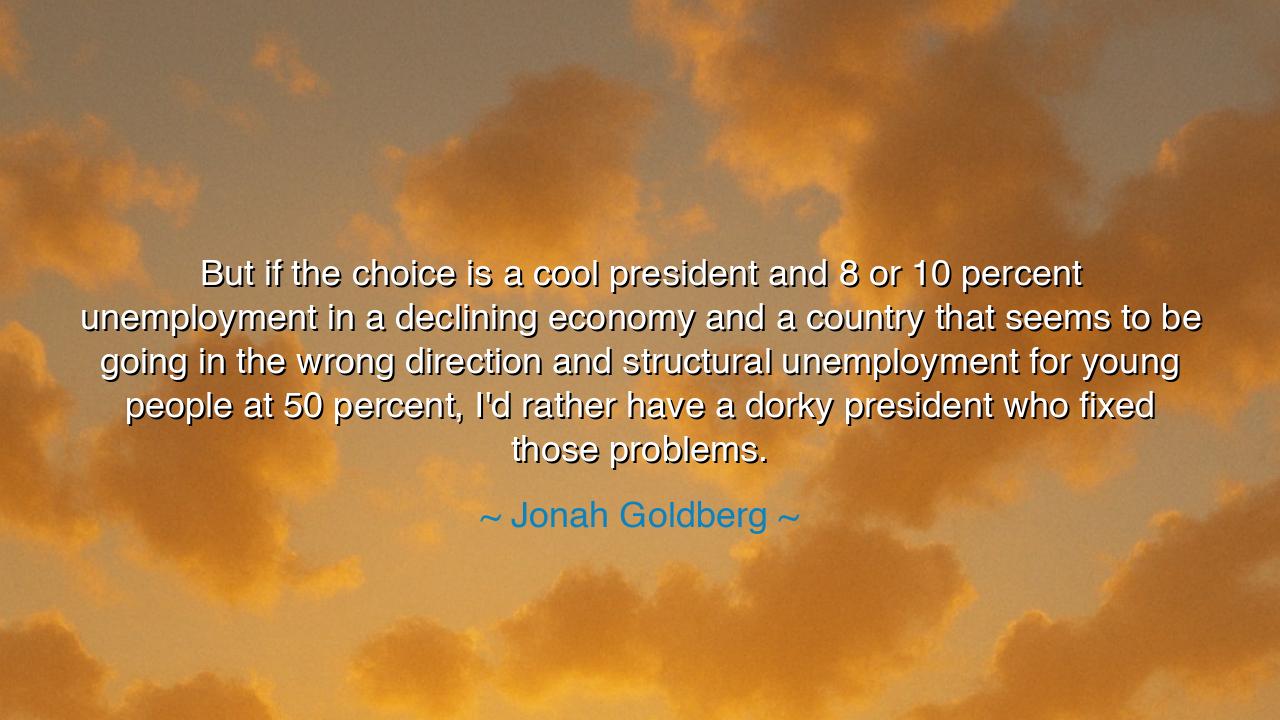
But if the choice is a cool president and 8 or 10 percent
But if the choice is a cool president and 8 or 10 percent unemployment in a declining economy and a country that seems to be going in the wrong direction and structural unemployment for young people at 50 percent, I'd rather have a dorky president who fixed those problems.






In the annals of history, the people have often been led by those whose qualities were not immediately grand or charismatic, but whose actions were deeply impactful and transformative. The great leaders are not always those who dazzle us with charm or who seem cool in the eyes of the masses. No, the true worth of a ruler is revealed by the results they bring about, by the progress they ignite in the hearts and minds of the people. It is this wisdom that is echoed in the words of Jonah Goldberg: “But if the choice is a cool president and 8 or 10 percent unemployment in a declining economy and a country that seems to be going in the wrong direction and structural unemployment for young people at 50 percent, I'd rather have a dorky president who fixed those problems.” This quote reflects a profound truth, one that resounds across the ages: substance over style, action over appearance.
The heart of this sentiment speaks to the age-old human struggle between immediate gratification and long-term benefit. The "cool president," like the charismatic leaders of past eras, may appeal to the hearts of the young, to the emotional whims of the people. Their speeches are stirring, their presence magnetic. Yet, when the tide of the nation shifts and the economy crumbles, when the young people find themselves with no hope for employment, it is not the charm of the leader that matters most, but their ability to confront the harsh realities with determination and practical solutions. As we have seen throughout history, it is the dorky, the seemingly awkward, the leaders who work quietly behind the scenes, tirelessly fixing the broken systems, that bring lasting change.
Consider the example of Abraham Lincoln during the darkest days of the American Civil War. He was not the epitome of charisma or grace. His image was far from the heroic figures etched in marble across the land. Yet, his resolve to preserve the Union and abolish slavery led to an era of profound transformation. The results of his leadership were not seen in the crowds’ cheers, but in the freedom of millions and the rebuilding of a fractured nation. Like the “dorky president” Goldberg speaks of, Lincoln faced immense challenges, yet he set aside personal glory to tackle the nation’s deepest problems.
History also tells us of the humble, unassuming leaders who have guided nations through perilous economic downturns. Leaders like Franklin D. Roosevelt, whose New Deal policies steered the United States out of the Great Depression. Roosevelt was not a "cool" figure in the conventional sense; his physical disability and often stern demeanor were at odds with the idealized vision of an inspiring leader. Yet, it was his practical policies, his focus on economic recovery, and his willingness to make tough, often unpopular decisions that restored hope and prosperity to millions of Americans. In those dark times, it wasn’t the allure of charm but the strength of leadership that carried the country forward.
From these examples, we learn that leadership is not about flashy speeches or an appealing public persona. It is about a clear vision, about the courage to make difficult choices even when they may cost personal approval or favor. It is about a leader who, like the “dorky president” of Goldberg’s words, is willing to tackle the most difficult problems head-on. Such leaders do not shy away from the complexities of economic collapse or high unemployment. They face them, not with superficial solutions, but with thoughtful, deliberate action.
The lesson here is clear: the world does not need a president, a leader, or a ruler who seeks only to please the people in the moment. What the world requires are those who will endure the unpopularity that comes with solving the difficult problems, who will navigate through turmoil to build a more stable future. As the ancient philosophers taught us, it is the long-term vision and integrity of a leader that truly defines their greatness, not their ability to win hearts with a fleeting charm. True greatness is forged in the fires of adversity.
So, to the youth of today, to those who aspire to lead or to change the world: do not seek the fleeting fame of a "cool" figure, but aspire to be a leader who brings forth lasting change. Focus not on how you are seen in the moment, but on the legacy you leave behind. Whether you are in business, in government, or in your own life, know this: those who face adversity with wisdom and strength, no matter how unassuming, are the ones who shape the future. Let this truth guide your journey, for it is through hard work, not appearance, that you will truly make a difference.






AAdministratorAdministrator
Welcome, honored guests. Please leave a comment, we will respond soon